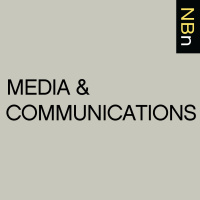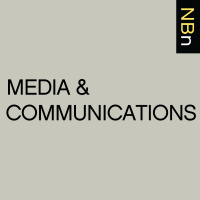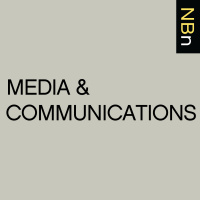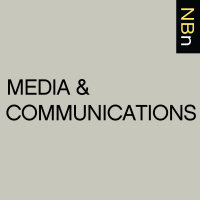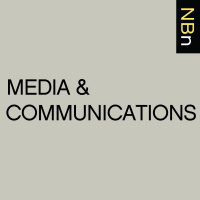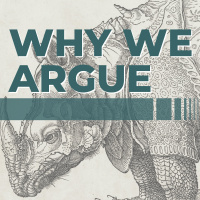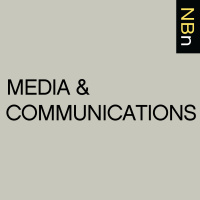Synopsis
Interviews with Scholars of Media and Communications about their New Books
Episodes
-
Brooke Erin Duffy “(Not) Getting Paid to Do What You Love: Gender, Social Media and Aspirational Work” (Yale UP, 2017)
16/08/2017 Duration: 38minWhat is life like in the aspirational economy? In (Not) Getting Paid to Do What You Love: Gender, Social Media and Aspirational Work (Yale University Press, 2017) Brooke Erin Duffy, an assistant professor in the Department of Communication at Cornell University, explores the working life of bloggers, social media stars, and online influencers (not) making a living in and around the fashion industry. The core of the book is the idea of aspirational labour, which captures the demands of trying to get in and get on in this precarious form of work. Aspirational labour is theorised in conjunction with gender and the broader inequalities of production and consumption in consumer culture. The book then uses this frame to explore the big winners of the social media economy, alongside detailing the hidden costs to being authentic and effortless online, as well as reflecting on the impact of aspirational labour on many other areas of economy and society. The book is packed with rich and detailed interview data, and is
-
Jennifer Fleeger, “Mismatched Women: The Siren’s Song Through the Machine” (Oxford UP, 2014)
13/08/2017 Duration: 31minJennifer Fleeger‘s Mismatched Women: The Siren’s Song Through the Machine (Oxford University Press, 2014) tells the story of women in film and their representation as aberrations, but also as moments of emancipation and agency. Fleeger’s book discusses exceptional voices such as Kate Smith, known as the First Lady of Radio; Deanna Durbin, whose soprano voice allegedly saved Universal Studios from bankruptcy, Susan Boyle the woman who shocked Britain’s Got Talent jury and public to the point of tears, amongst many others. Fleeger’s approach broadens the traditionally cinematic context of feminist psychoanalytic film theory to account for literary, animated, televisual, and virtual influences. All the songs played in this episode are available on the books companion website, available here. Learn more about your ad choices. Visit megaphone.fm/adchoices
-
David Beer, “Metric Power” (Palgrave Macmillan, 2016)
02/08/2017 Duration: 34minHow do metrics rule the social world? In Metric Power (Palgrave Macmillan, 2016) David Beer, Reader in Sociology at the University of York, outlines the rise of the metric and the role of metrics in shaping everyday life. The book outlines the core theoretical concepts, such as neo-liberalism, bio-power, and bio-politics, alongside the characteristics themes of metric power, including practices of making (in)visible, the social life of methods and data, and questions of agency. These theoretical discussions are set against the broad backdrop of the rise of big data, corporate power, social media, and algorithm based decision making. Metric Power is located within the study of broader social inequalities, meaning the book makes important reading for anyone concerned with how our daily experiences of technologies, organisations, and social institutions, are shaped, unequally, by the power of metrics. Learn more about your ad choices. Visit megaphone.fm/adchoices
-
Riki Wilchins, “TRANS/gressive: How Transgender Activists Took on Gay Rights, Feminism, the Media, and Congress…and Won!” (Riverdale Avenue Books, 2017)
26/07/2017 Duration: 55minBefore Transgender actors entered popular culture, and before the “T” was included in LGBT, Transgender activism was a small and marginalized movement. However, though courage and perseverance, Transgender rights began to enter the public consciousness. Drawing on her own life story, Riki Wilchin’s newest book TRANS/gressive: How Transgender Activists took on Gay Rights, Feminism, the Media & Congress…and Won! (Riverdale Avenue Books, 2017) traces the origins of the Transgender movement. From the backwoods of rural Michigan to the nation’s capital, the movement challenged not only conservative politicians and worldviews but also challenged the boundaries of gender, sex, and sexuality within more progressive movements. How do Trans issues and concerns intersect with notions of masculinity and femininity? What was the relationship between the Trans movement and the Gay movement? How do movements transcend the local and become national? Wilchins offers answers to these (and many more) questions within the pages
-
Patty Farmer, “Playboy Laughs: The Comedy, Comedians, and Cartoons of Playboy” (Beaufort Books, 2017)
16/07/2017 Duration: 53minIn her new book, Playboy Laughs: The Comedy, Comedians, and Cartoons of Playboy (Beaufort Books, 2017), Patty Farmer examines the relationship between Hugh Hefner’s Playboy empire and some of the most influential comedians and cartoonists of the past 50 years. Farmer explores the ways in which the Playboy Clubs and Resorts of the 1960s and 1970s established spaces for comedians to hone their acts, get paid, and started the careers for many comedians and musicians. She looks at the savvy business decisions of Hefner that led to clubs which have influenced popular culture and society in a variety of ways. Farmer describes how establishing these clubs challenged racial barriers as desegregated comedy clubs in the 1960s as well as gender barriers, giving a performance space to many rising female comedians such as Phyllis Diller and Joan Rivers. Farmer also looks at the role Playboy magazine played in launching the careers of many cartoonists such as Shel Silverstein and Al Jaffe and the meticulous attention to de
-
Eileen Le Han, “Micro-Blogging Memories: Weibo and Collective Remembering in Contemporary China” (Palgrave Macmillan, 2016)
12/07/2017 Duration: 53minSince its invention, the Internet has become a fundamental part of our lives. Since the invention of social media, communicative technologies have changed our lives and influenced journalism and politics in ways that were unimaginable just ten years ago. In her book, Micro-blogging Memories: Weibo and Collective Remembering in Contemporary China (Palgrave Macmillan, 2016), Eileen Le Han explores how the social media site Weibo has influenced Chinese culture and politics. By analysing the relationship between three key tensions: control-resistance, past-present, and global-local, Le Han provides a unique and in-depth account on how social media is used in an increasingly globalising China. By focusing on specific events and how they were reported on, and more significantly, how they are remembered, Le Han explores the contentious topics of state-sponsored censorship, increasing nationalism and the collectivisation of memory. The first five years of Weibo were a turning point in Chinese society, a time in which
-
Simone Muller, “Wiring the World: The Social and Cultural Creation of Global Telegraph Networks” (Columbia UP, 2016)
10/07/2017 Duration: 54minSimone Muller’s Wiring the World: The Social and Cultural Creation of Global Telegraph Networks (Columbia University Press, 2016) is a superb account of the laying of submarine telegraph cables in the nineteenth century and the battles over them in the subsequent decades. Her book shows how expanding telegraph networks were instrumental in processes of capitalism, nation-building, and globalization. To track these grand developments, however, Muller reconstructs the network of people who built, managed, and fought over telegraph networks. She calls this eclectic collection of financiers, engineers, entrepreneurs, and politicians “actors of globalization.” Muller’s book is an historical kaleidoscope that shows the multi-faceted meaning of telegraphy. Her actors imbued telegraphy with hopes of world peace, of Weltcommunication (a predecessor of the global village idea), of a global electric union, and of bolstering the civilizing mission. Even if submarine telegraphy never achieved these aspirations, her book
-
Paul C. Jasen, “Low End Theory: Bass, Bodies and the Materiality of Sonic Experience” (Bloomsbury, 2016)
08/07/2017 Duration: 01h08minAs audio technology has advanced, so has our love-affair with deep bass. Dr. Paul Jasen‘s book, Low End Theory: Bass, Bodies and the Materiality of Sonic Experience (Bloomsbury, 2016), probes the much-mythologized field of bass and low-frequency sound. It begins in music but quickly moves far beyond, following vibratory phenomena across time, disciplines and disparate cultural spheres. Dr. Jasen asks what it is about bass that has fascinated us for so long and made it such a busy site of bio-technological experimentation, driving developments in science, technology, the arts, and even religious culture. The guiding question is not so much what we make of bass, but what it makes of us: how does it undulate and unsettle; how does it incite; how does it generate the phenomenon of bodily thought? As one critic puts it, Low End Theory provides us with an ontology of bass. With its focus on sounds structuring agency and the multi-sensory aspects of sonic experience, Dr. Jasen’s work stands to make a transformative
-
Thomas Hazlett, “The Political Spectrum: The Tumultuous Liberation of Wireless Technology” (Yale UP, 2017)
30/06/2017 Duration: 45minWhat better way to explore the history of media regulation than to go on a journey with the former chief economist of the FCC? Prior to introduction of the Federal Radio Commission in 1927, the radio spectrum was in chaos. Broadcasters were attempting to drown out their rivals with powerful signals and the detrimental effect on the public interest was profound. Or was it? In The Political Spectrum: The Tumultuous Liberation of Wireless Technology, from Herbert Hoover to the Smartphone (Yale University Press, 2017), distinguished legal and economic scholar Thomas Hazlett challenges the notion that U.S. government intervention was vital to protect and save the industry. Hazlett argues that, for nearly a century, disruptive technologies, competition and alternative viewpoints have been quashed, by special interest groups claiming to know better. Hazlett blends his discussion on legislation with the rise of new technologies in a way that in accessible to everyone, even if you have no prior knowledge of media pol
-
Good & Bad Arguments with Trudy Govier
28/06/2017 Duration: 28minTrudy Govier is Emerita Professor of Philosophy at the University of Lethbridge in Alberta, Canada. Her research is focused on the nature of argumentation and questions concerning social trust, forgiveness, and reconciliation. She is also the author of a highly influential informal logic text, A Practical Study of Argument (7th edition, Cengage), as well as Forgiveness and Revenge (Routledge 2002) and Victims and Victimhood (Broadview 2015). The "Why We Argue" podcast is produced by the Humanities Institute at the University of Connecticut as part of the Humility and Conviction in Public Life project. Learn more about your ad choices. Visit megaphone.fm/adchoices Support our show by becoming a premium member! https://newbooksnetwork.supportingcast.fm/communications
-
Mitchell Stephens, “The Voice of America: Lowell Thomas and the Invention of 20th Century Journalism” (St. Martin’s, 2017)
27/06/2017 Duration: 50minMitchell Stephens‘s new book, The Voice of America: Lowell Thomas and the Invention of 20th Century Journalism (St. Martins Press, 2017), could be described, in part, as an entertaining book of stories about a legendary American storyteller. Stephens, professor of journalism at New York University, traces Lowell Thomas’s long career from his early days in the rough and tumble world of Chicago newspapers to his later fame as one of America’s earliest and longest-running radio newscasters and its first TV news host. Stephens tells how Thomas documented the First World War, weaving together photos, films and his own remarkable gift for oratory in multimedia presentations that he delivered live to two million people in theaters all over the world. It was Lowell Thomas who first reported the war exploits of Lawrence of Arabia, making both T.E. Lawrence and Thomas himself household names. As a journalism historian and author of the previous book, A History of News, Mitchell Stephens argues that Lowell Thomas hel
-
Blake Atwood, “Reform Cinema in Iran: Film and Political Change in the Islamic Republic” (Columbia UP, 2016)
26/06/2017 Duration: 27minIranian cinema has close connections to the 1979 Islamic revolution. Ayatollah Khomeini , explicitly pointed to the uses of cinema for religious and revolutionary political purposes. But Iranian films and the means of film production gradually changed in the post-Khomeini period. In Reform Cinema in Iran: Film and Political Change in the Islamic Republic (Columbia University Press, 2016), Blake Atwood, Assistant Professor in the Department of Middle Eastern Studies at the University of Texas at Austin, explores the trajectories of Iranian cinema within the transforming cultural and political landscapes of the 1990s. Many of these changes were fostered by the leader of the Reformist Movement and then Iranian president, Mohammad Khatami. Atwood explores documentary and narrative films, political speeches, and institutional policies to determine how reform cinema shaped public opinion, social practices, and political sensibilities. During this period, there are observable changes in industrial and aesthetic cine
-
Mark Banks, “Creative Justice: Cultural Industries, Work and Inequality” (Rowman and Littlefield, 2017)
20/06/2017 Duration: 49minHow can we address inequity and injustice in cultural and creative industries? In Creative Justice: Cultural Industries, Work and Inequality (Rowman and Littlefield, 2017), Mark Banks, a professor of culture and communication and director of CAMEo, the research institute for Cultural and Media Economies, at the University of Leicester, sets out a new approach to cultural and creative industries, focused on creative justice. Creative justice develops through the seven chapters of the book, which engage with a range of interdisciplinary concerns about cultural and creative work. The book restates the importance of cultural objects (which are often marginalised in sociological analysis) before moving to consider how justice might be done to the practices of creative work and the workers themselves. Later parts of the analysis think through questions of access, both historical and contemporary, to the cultural sector, with a new set of concepts for creative justice forming the conclusion of the book. It will be e
-
Gillian McIver, “Art History for Filmmakers: The Art of Visual Storytelling” (Bloomsbury, 2016)
14/06/2017 Duration: 48minGillian McIver‘s Art History for Filmmakers: The Art of Visual Storytelling (Bloomsbury, 2016) is a ground-breaking book that illustrates the relationships among the histories of painting and cinema. Of interest to established filmmakers, students of film, and those engaged with the history of art and visual storytelling overall, Art History for Filmmakers is a comprehensive study of the ways in which painting and film influence one another in terms of light, composition, subject matter, theme and style. McIver presents examples of the impact of painting from the antique to the modern upon the work of filmmakers Peter Greenaway, Martin Scorcese, Peter Webber, Stan Douglas, Guillermo de Toro, John Ford and others. Through an array of color images, McIver demonstrates how Dutch Baroque, Realism, Surrealism, Expressionism, Minimalism and other art historical movements shape story and appearance in film. Art History for Filmmakers also provokes consideration of the ways the language of film brings idea and form t
-
Clyde Farnsworth, “Tangled Bylines: A Father and Son Cover the Twentieth Century” (U. Missouri Press, 2017)
31/05/2017 Duration: 43minJournalists intentionally leave themselves out of the stories they cover. In Clyde H. Farnsworth‘s book Tangled Bylines: A Father and Son Cover the Twentieth Century (University of Missouri Press, 2017) he gets the chance to tell not only his own stories, but also those of his journalist father. Farnsworth spent most of his career as a foreign correspondent and both he and his father worked at the same time at the New York Times. In the book he shares what it was like to cover historical events and grow up in the shadow of his father’s career. The book features stories about unique encounters with notable people, such as Amelia Earhart and Winston Churchill as well as personal vignettes of a real-life family in the twentieth century. Tangled Bylines provides unique perspectives on the transformations and consistencies in journalism from the 1920s through to the digital age. It provides a foundation for understanding a specific, sometimes singular facet of the history of American journalism. Learn more about
-
James Poyner, “Trump Tweets: His Social Media Phenomenon” (Wilkinson Publishing, 2017)
18/05/2017 Duration: 01h19minThe title of James Poyner’s book, Trump Tweets: His Social Media Phenomenon (Wilkinson Publishing, 2017), tells you everything you need to know about the world you about to enter. In temperament, and style, Trump was unlike any presidential candidate who came before him. The media and the public were enthralled with his antics. However, what stood out for many was Trumps thoroughly unique communication style. This book gives an in-depth look at how Trump used Twitter to attack, criticise, publicise and expand the reach of brand Trump. Poyner uses several key events to move the book forward and tell the story of how Trump used Twitter, from the start of his presidential campaign right up until Inauguration day. Exploring not only Trumps tweets but the publics reaction to them, Poyner is able to capture unique moments in history and examine how they impacted the race to the White House. The term Twitter-storm was coined long before Trump threw his hat into the presidential race but no other figure, since the
-
Different Medias with Eric Alterman
18/05/2017 Duration: 29minHow can we as consumers distinguish between the many different political medias? Eric Alterman is CUNY Distinguished Professor of English and Journalism at Brooklyn College. Eric is also a columnist for The Nation, and a senior fellow at the Center for American Progress in Washington and the World Policy Institute in New York. He is the author of several books, including When Presidents Lie (Penguin 2004), Kabuki Democracy (Nation Books 2011), and most recently, Inequality and One City (Nation Books 2015). The "Why We Argue" podcast is produced by the Humanities Institute at the University of Connecticut as part of the Humility and Conviction in Public Life project. Learn more about your ad choices. Visit megaphone.fm/adchoices Support our show by becoming a premium member! https://newbooksnetwork.supportingcast.fm/communications
-
Matt Pearl, “The Solo Video Journalist: Doing It All and Doing it Well in TV Multimedia Journalism” (Focal Press, 2016)
04/05/2017 Duration: 01h46sWhile the title of Matt Pearl‘s book, The Solo Video Journalist: Doing it All and Doing It Well in TV Multimedia Journalism (Focal Press, 2016), hints at a solitary existence, he shares experiences of many journalists who have inspired his work and emphasizes the community built around multimedia journalism. He has worked in television news for more than a decade and shares what he’s learned in a clear and logical way while still telling a story. The book gives a hands-on approach that walks the reader through planning a segment, dressing the part, conducting interviews and editing the content. For quite a long period of time, those in news media were part of a stable industry that hadn’t seen much change. The past few decades have been the opposite of stable. The expectations of those in journalistic roles are more fluid today. The definition of a multimedia journalist is a moving target of sorts, and Pearl has experienced adapting to those shifts and changes in the field. The book not only provides useful i
-
Jeremy C. Young, “The Age of Charisma: Leaders, Follwoers, and Emotions in American Society, 1870-1940” (Cambridge UP, 2017)
04/05/2017 Duration: 51minIn the age of the railroad, social movements, revivals, and campaigns for political office spread like wildfire across the United States. Leaders and their surrogates could go travel faster than ever before, even as industrial capitalism overthrew the public and private relationships of a previous era. As would-be movement leaders discovered their growing power to reach a national audience, their experience speaking to gathered crowds in city after city and town after town produced a new style of public address. Jeremy C. Young‘s The Age of Charisma: Leaders, Followers, and Emotions in American Society, 1870-1940 (Cambridge University Press 2017), traces the history of that new style from the theoretical foundation laid down by its forbears in the 1840s, through the battles over charisma’s power at the height in the early 1900s, to its eventual decline as a new technology, radio, again flipped the script on what it meant to address a national audience. The Age of Charisma is a fascinating history of a period
-
Kathleen Collins, “Dr. Joyce Brothers: The Founding Mother of TV Psychology” (Rowman and Littlefield, 2016)
22/04/2017 Duration: 53minIn her book, Dr. Joyce Brothers: The Founding Mother of TV Psychology (Rowman and Littlefield, 2016), Kathleen Collins presents an extensive history of the woman who is arguably the most famous television psychologist. Starting with Brothers’ appearance as a boxing expert on the $64,000 Question in the 1950s, and bringing readers through her decades-long career in television and radio, Collins argues that Brothers created the personal approach to psychology that became the norm for television other popular media. Collins examines the different ways that Brothers created a career for herself for over 50 years, looking at her role as psychologist, as well as her roles as guest star, actor, and media celebrity. She looks at the ways Brothers used her savvy business sense to create a multilayered career that made vital contributions to psychology, television, and U.S. cultural history. Collins uses Brothers’ personal papers and her published interviews as well as her own interviews with Brothers’ daughter and col

